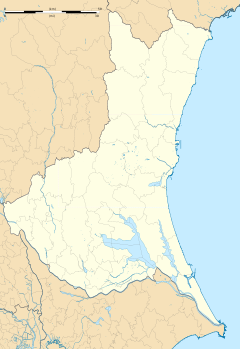This article needs additional citations for verification. (January 2017) |
Isohara Station (磯原駅, Isohara-eki) is a passenger railway station in the city of Kitaibaraki, Ibaraki Prefecture, Japan, operated by East Japan Railway Company (JR East).
Isohara Station 磯原駅 | ||||||||||||||||
|---|---|---|---|---|---|---|---|---|---|---|---|---|---|---|---|---|
 Isohara Station in May 2008 | ||||||||||||||||
| General information | ||||||||||||||||
| Location | 759 Isohara, Isohara-cho, Kitaibaraki-shi, Ibaraki-ken 319-1541 Japan | |||||||||||||||
| Coordinates | 36°47′27″N 140°44′45″E / 36.7907°N 140.7458°E | |||||||||||||||
| Operated by | ||||||||||||||||
| Line(s) | ■ Joban Line | |||||||||||||||
| Distance | 171.6 km from Nippori | |||||||||||||||
| Platforms | 2 side platforms | |||||||||||||||
| Other information | ||||||||||||||||
| Status | Staffed | |||||||||||||||
| Website | Official website | |||||||||||||||
| History | ||||||||||||||||
| Opened | 25 February 1897 | |||||||||||||||
| Passengers | ||||||||||||||||
| FY2019 | 1697 daily | |||||||||||||||
| Services | ||||||||||||||||
| ||||||||||||||||
| ||||||||||||||||
Lines
editIsohara Station is served by the Joban Line, and is located 171.6 km from the official starting point of the line at Nippori Station.
Station layout
editThe station consists of two elevated opposed side platforms. The station building is elevated to the level of the platforms; however, connection between the platforms is made an overhead walkway. The station is staffed. Nanatsu no Ko is used as the departure melody.[1]
Platforms
edit| 1 | ■ Joban Line | for Takahagi, Hitachi, Katsuta, Mito, Tomobe, Ishioka and Tsuchiura |
| ■ Jōban Line (Limited Express) | for Takahagi, Mito, Ueno, Tokyo and Shinagawa | |
| 2 | ■ Jōban Line | for Iwaki, Tomioka, Namie and Haranomachi |
| ■ Jōban Line (Limited Express) | for Iwaki and Sendai |
History
editIsohara Station was opened on 25 February 1897. The station was absorbed into the JR East network upon the privatization of Japanese National Railways (JNR) on 1 April 1987. It was rebuilt as an elevated station building in October 1997.[citation needed]
Passenger statistics
editIn fiscal 2019, the station was used by an average of 1697 passengers daily (boarding passengers only).[2]
Surrounding area
edit- Kita-Ibaraki Post Office
- National Route 6
- Isohara Industrial Park
See also
editReferences
edit- ^ https://www.youtube.com/watch?v=VhZ9dYzAJbI 7.11.2009
- ^ 各駅の乗車人員 (2019年度) [Station passenger figures (Fiscal 2019)] (in Japanese). Japan: East Japan Railway Company. 2020. Retrieved 11 August 2020.
External links
edit- Media related to Isohara Station at Wikimedia Commons
- Official website (in Japanese)

